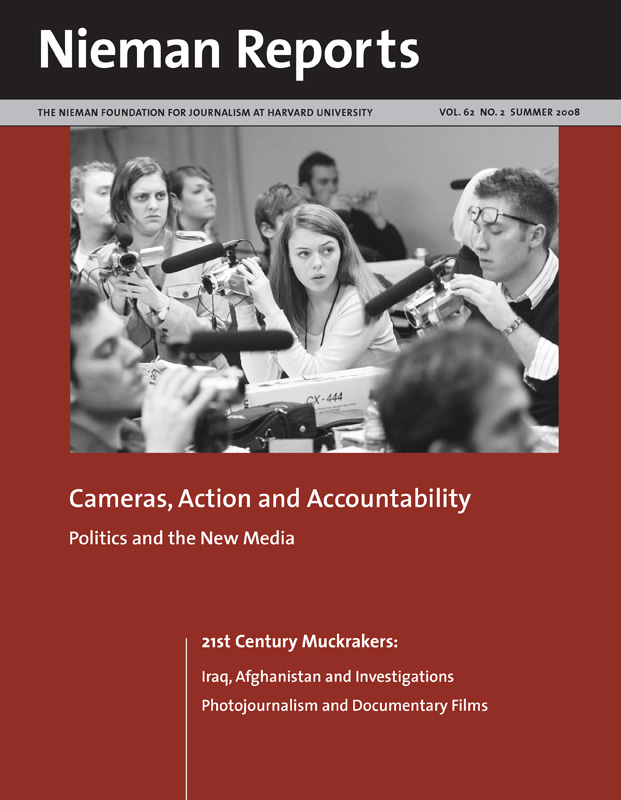Today’s news is often thought of as an opinion-driven business. Just ask Bill O’Reilly and Maureen Dowd and thousands of bloggers whose opinions go unchecked. As MTV’s Street Team ’08 correspondent in Kansas, I often wonder, “Can I be a reporter and an opinionated pundit?” It’s a question compounded by my other job as a reporter at the Lawrence Journal-World, the daily newspaper in Lawrence, Kansas.
Being a correspondent for MTV’s Street Team means wearing many hats. Each of us is an individual news bureau and when we do our stories we are part reporter, part columnist, and part citizen. With so many intersecting roles, it can be confusing to know which role to play when.
All of us are really part of an experiment that combines political newsgathering with the life experiences and viewpoints of 51 young Americans who have a passion for news, politics and storytelling. Since not all of us have news backgrounds, we wrestle at times with issues such as where our punditry ought to end and our reporting should begin. Or we wonder what the appropriate mix of the two is in this opinionated digital media environment.
I’ve battled with such questions. Right now. This spring I struggled to write a blog entry about a controversial legislative initiative in Kansas that deals with obscenity in schools. I had an opinion about the issue, which my first draft reflected, even though I relied on multiple sources of information in the process of writing this piece.
As a one-man news bureau, I have limited time and resources. Often I work on deadline to find and produce stories. In February, I covered a gathering of the controversial Minuteman Civil Defense Corps in Kansas City. Passionate protestors railed against the Minutemen and their alleged ties to white supremacists, and their words produced great sound bites. But I wasn’t able to film inside the theater where the Minutemen were gathered. I could only record the speeches of the group’s leaders. While those speeches conveyed the group’s key messages, they offered little in the way of balance to the irate words of the protestors.
In doing such a story, I realized that I was acting in some ways as a gatekeeper of what those who come to my MTV reports on the Web get to hear and see. And that’s a lot of responsibility. What I was able to do, however, was enhance my video (which contained still photos) with a blog entry in which I explained the various motivations of each group.
I’ve discovered that it’s hard to fit everything into a video; sometimes I’ve had to leave some content out; if I don’t, I know that at some point the audience’s eyes will glaze over. By adding another dimension to my report — the blog — I was able to more fully explain why each group was there, and this, I believe, made my report more compelling and well rounded.
If we want to be successful on the Web, it’s got to be “guerrilla journalism,” edgy and unpredictable. This might mean stepping into the swirling waters of punditry and opinion, and that makes me uncomfortable even though I know this blogging battle is happening throughout journalism.
Every news organization plays to its audience, and I hope to inform and entertain young people in Kansas. But I do struggle with how to do this without alienating those who read my work at the Journal-World. Even though I am only a part-time reporter there that doesn’t mean I shouldn’t bear in mind the readers’ perception of my reporting in any medium.
In the end, what guides my reporting is my mantra that I won’t produce anything for MTV that I would be uncomfortable putting in the Journal-World. But striking a balance between reportage and entertainment — and the need for eyeballs (or clicks) — is a challenge I confront.
Alex Parker is MTV News Street Team ’08 member for Kansas. He is a graduate student of journalism at the University of Kansas and a reporter for the Lawrence Journal-World.



